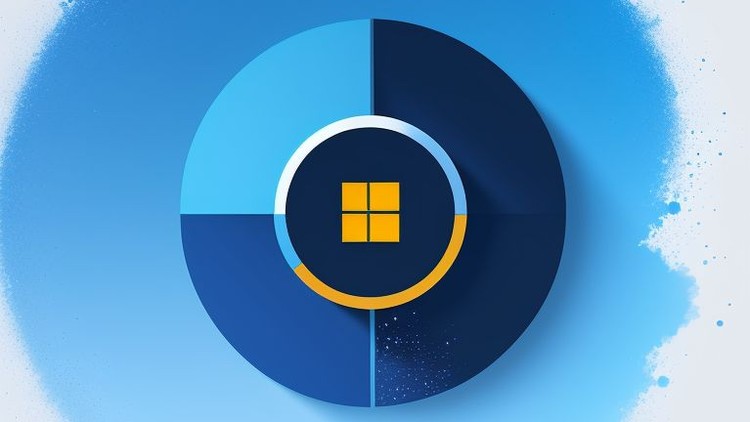
“Mastering Data Analysis with Power BI: From Insights to Impact”
What you will learn
Data Preparation Connecting to different data sources (Excel, databases, Azure, etc.)
Data Modeling Creating and managing data models
Data Visualization and Analysis Building interactive reports and dashboards
Deployment and Maintenance Publishing reports to the Power BI service
Why take this course?
Welcome to the PL-300 Power BI Data Analyst course! In today’s data-driven world, the ability to transform raw data into actionable insights is an invaluable skill, one that can be applied across nearly every industry. This course is designed to equip aspiring data analysts, business intelligence professionals, and data enthusiasts with the skills to master Microsoft Power BI, a leading tool in data visualization and business intelligence. Through a combination of in-depth lessons and hands-on practice, you’ll learn how to build sophisticated data models, design interactive dashboards, and communicate data insights in ways that support informed decision-making.
By the end of this course, you’ll not only be prepared for the PL-300 certification exam but will also have practical skills to approach real-world data challenges with confidence and creativity. Whether you’re aiming to advance your career, transition into data analytics, or enhance your reporting capabilities, this course provides the knowledge and experience you need to succeed.
What is Power BI and Why Should You Learn It?
Microsoft Power BI is a powerful business intelligence platform used to create interactive data reports and dashboards. Power BI is celebrated for its flexibility, connectivity to various data sources, and user-friendly interface, making it an ideal tool for data professionals as well as business users. With Power BI, you can pull in data from virtually any source, transform it into meaningful insights, and display it in formats that decision-makers can easily understand and act upon. The platform supports everything from basic charting and reporting to advanced data modeling and visualization, allowing users to gain insights from vast datasets.
For anyone who works with data regularly—whether for business analysis, reporting, or decision-making—learning Power BI is a crucial step in building or advancing a data-driven career. Completing the PL-300 course provides you with recognized credentials and, more importantly, the skills to stand out in data analytics.
Who Should Take This Course?
This course is perfect for:
- Data Analysts who want to enhance their reporting and analysis capabilities.
- Business Intelligence (BI) Professionals aiming to streamline and advance their data processes with Power BI.
- Managers and Business Decision-Makers who want to build data visualizations to inform strategy and decision-making.
- IT Professionals and Database Specialists looking to bridge the gap between data management and visualization.
- Excel Power Users ready to level up from traditional spreadsheets to a more robust and versatile BI tool.
- Aspiring Data Professionals wanting to break into data analytics with a highly in-demand skill set.
If you’re looking to translate data into dynamic visual insights, or simply want to add Power BI to your analytical toolkit, this course is designed for you.
Course Overview
The PL-300 course is structured to guide you from basic to advanced Power BI techniques, covering the following key areas:
- Data Preparation
- Learn how to connect to various data sources, including Excel files, SQL databases, web sources, and cloud platforms like Azure.
- Understand how to clean and structure data with Power Query Editor, handling missing values, removing duplicates, and transforming columns to set up data for further analysis.
- Discover data-loading strategies, and explore the data model’s flexibility for handling both structured and semi-structured data.
- Data Modeling
- Dive into data modeling concepts by establishing relationships between tables, setting up hierarchies, and creating calculated columns.
- Explore Data Analysis Expressions (DAX), the formula language used in Power BI, to develop calculated columns, measures, and custom aggregations that add depth to your analysis.
- Understand optimization techniques to ensure your model performs well, even with large datasets.
- Data Visualization and Analysis
- Learn how to build engaging, interactive visuals including charts, tables, gauges, and slicers. You’ll see how to add interactivity with features like drill-through, bookmarks, and tooltips to create a more intuitive experience for end users.
- Design aesthetically pleasing and informative reports that make data accessible and actionable for your audience.
- Discover best practices in data visualization, such as choosing the right visuals for the data, using color effectively, and designing layouts that emphasize key insights.
- Deployment and Maintenance
- Master the process of publishing reports to the Power BI service, enabling report sharing and collaboration.
- Explore Power BI workspaces, where you’ll learn to organize, manage, and distribute reports within a team or organization.
- Set up data refresh schedules to keep reports up-to-date and configure row-level security to control access based on user roles.
- Monitor performance and usage metrics to optimize report efficiency and assess their impact.